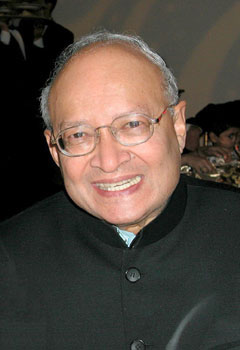|
NRI, professor
inducted into this Hall of Fame in 2006
- 'Nobel Class' as a result of his contributions to two
related disciplines: mathematics and engineering.
- Inventor, and an entrepreneur, Kailath founded the Information
Systems Laboratory (ISL) at Stanford University
- Co-founded several high-technology companies,
Outstanding Indian American mathematician-entrepreneur
March 12 2006
IANS
SAN FRANCISCO: Stanford University professor Thomas Kailath,
inducted into the Silicon Valley Engineering Hall of Fame,
is the lone Indian American to be so honoured this year -
a recognition of his extraordinary successes straddling the
world of academia and industry, mathematics and engineering
for 45 years.
The only award missing from the long list honours conferred
on him is the Nobel Prize, according to indolink.com, a website
that chronicles the achievements of outstanding Indian Americans.
However, the article states, the Institute for Scientific
Information's (ISI) database of Highly Cited Researchers has
judged him to be 'Nobel Class' as a result of his contributions
to two related disciplines: mathematics and engineering.
The Silicon Valley Engineering Hall of Fame, awarded last
month, aims to celebrate the accomplishments of engineers
in Silicon Valley who have demonstrated outstanding professional
achievement and have made significant contributions to the
Silicon Valley community.
Prior to Kailath, only two other Indian Americans have received
this rare honour - Kumar Malavalli, co-founder of Brocade
Communications Systems, and Mihir Parikh, founder of Asyst
Technologies. Both were inducted into this Hall of Fame in
2003.
After earning his BE degree from Poona University in 1956,
Kailath did his graduate degree in electrical engineering
from the Massachusetts Institute of Technology (MIT) in the
United States.
In his career as an academician, inventor, and an entrepreneur,
Kailath founded the Information Systems Laboratory (ISL) at
Stanford University.
The laboratory has played a pivotal technology-transfer role
in the growth and success of the Silicon Valley, and boasts
of numerous highly successful and influential technology companies
that have their roots in the research work done in it.
Kailath has co-founded several high-technology companies,
three of which are now public: Integrated Systems (founded
in 1980 and merged with WindRiver Systems in 1999), Numerical
Technologies (founded in 1995), and Excess Bandwidth Corporation
(founded in 1998 and acquired by Virata Corporation in 2000,
which itself merged with Globespan in 2001).
In the course of his research and teaching, he has mentored
over a hundred doctoral and postdoctoral students and authored
or co-authored over 300 journal papers.
Kailath has held Guggenheim, Churchill and Humboldt fellowships,
among others. He served as president of the IEEE Information
Theory Society in 1975 and received its Shannon Award in 2000.
He has also held short-term appointments at several institutions
around the world, including the Indian Institute of Science,
Bangalore, and the Indian Statistical Institute, Kolkata.
Kailath joined Stanford University as acting associate professor
of Electrical Engineering in 1963 and became a professor in
1968. He served as director of the university's Information
Systems Laboratory from 1971 through 1980, and as an associate
department chair from 1981 to 1987. He then became the first
holder of the Hitachi America Professorship in Engineering,
which he held from 1988 to 2001. He assumed emeritus status
in June 2001, but has been recalled to active duty to continue
his research and writing activities.
--------------------------------------------------------------------------------
BIOGRAPHY
Thomas Kailath received a B.E. (Telecom) degree from the
College of Engineering,Pune,India, in June 1956, and S.M.
and Sc,D, degrees in Electrical Engineering from the Massachusetts
Institute of Technology in June 1959 and June 1961,respectively.
He has also received honorary degrees from Linkoping University(Sweden),
Strathclyde University (Scotland), the University of Carlos
III, Madrid (Spain), and the University of Bordeaux (France),
From October 1961 to December 1962, he worked in the Communications
Research division of the Jet Propulsion Laboratories, Pasadena,
CA, and also taught part-time at the California Institute
of Technology. Since then he has been at Stanford University,
where he is currently Hitachi America Professor of Engineering,
Emeritus. He has also held shorter-term appointments at several
institutions around the world.
Professor Kailath's research has spanned a large number of
disciplines, emphasizing information theory and communications
in the sixties, linear systems, estimation and control in
the seventies, VLSI design and sensor array signal processing
in the eighties, and applications to semiconductor manufacturing
and digital communications in the nineties. Concurrently,
he contributed to several fields of mathematics, especially
stochastic processes, operator theory and linear algebra.
He has authored,edited and coauthored several books,including
Linear Systems, Prentice Hall, 1980, Indefinite Quadratic
Estimation and Control (with B. Hassibi and A. H. Sayed),
SIAM, 1999, and Linear Estimation (with A. H. Sayed and B.
Hassibi), Prentice Hall, 2000. In the course of his research
and teaching, Professor Kailath has mentored over a hundred
doctoral and postdoctoral students and authored or co-authored
over 300 journal papers. He has received outstanding paper
prizes from the IEEE Information Theory Society, the IEEE
Signal Processing Society, the European Signal Processing
Society, and the IEEE Transactions on Semiconductor Manufacturing.
Professor Kailath has held Guggenheim, Churchill and Humboldt
fellowships, among others. He served as President of the IEEE
Information Theory Society in 1975, and received its Shannon
Award in 2000. Among other awards are the Technical Achievement(1989)
and Society(1991) Awards of the IEEE Signal Processing Society
, the 1995 IEEE Education Medal , and (with A. Sayed) the
1996 IEEE Donald G. Fink Prize Award. He is a member of the
National Academy of Engineering, the National Academy of Sciences,
the American Academy of Arts and Sciences, the Third World
Academy of Sciences, the Indian National Academy of Engineering,
and the Royal Spanish Academy of Engineering.
|

